

|
|
|

|
|
| WHAT'S SELLING WHERE | |
| A look at bestseller lists from the nation's best independent bookstores. This week's list is from the Cody's Books in Berkely, CA. HARDCOVER FICTION 1. The Broker John Grisham 2. The Da Vinci Code Dan Brown 3. The Final Solution Michael Chabon 4. Gilead Marilyn Robinson 5. Runaway Alice Munro 6. The Plot Against Amerca Philip Roth 7. The Five People You Meet In Heaven Mitch Albom 8. Case Histories Kate Atkinson 9. State of Fear Michael Crichton 10. Jonathan Strange & Mr. Norrell Susanna Clarke HARDCOVER NONFICTION 1. Collapse Jared Diamond 2. Blink Malcolm Gladwell 3. French Woman Don't Get Fat Mireille Guiliano 4. On Food & Cooking Harold J. McGee 5. The Daily Show With Jon Stewart Presents America Jon Stewart 6. Confessions of an Economic Hit Man John Perkins 7. Animals in Translation Temple Grandin 8. He's Just Not That Into You Greg Behrendt & Liz Tuccillo 9. Witness: For The Prosecution of Scott Peterson Amber Frey 10. What's the Matter With Kansas? Thomas Frank Cody's Books 2454 Telegraph Avenue Berkeley, CA 05255 510–845–7852 |

|
||
|
Don't want to register for a site but need log on i.d.s and passwords? Get them at BugMeNot.com. MobyLives towers above all other literary weblogs. — The Complete Review Friday 4 February 2005 Amazon stocks plunge after Amazon Prime announcement . . . "Shares in Amazon.com sank nearly 17 percent Thursday after the company reported a sharp jump in fourth–quarter earnings but still fell short of Wall Street expectations amid what analysts say is a market that is becoming increasingly ferocious for the Internet retailing giant." As Allison Linn reports in an Associated Press wire story, "Investors sent shares of Amazon.com Inc. down $6.95 to $34.93 in Thursday morning trading, leaving Amazon shares near a 52–week low of $33 set on Oct. 22 after the company reported third–quarter results that disappointed investors." The plunge also came a day after Amazon announced that "it would begin offering its customers the option of paying a flat annual fee of $79 for unlimited free two-day shipping on orders. The deal also would let customers pay just $3.99 for overnight shipping." Known as Amazon Prime, the membership has been the talk of the book business for the last two days, with some saying it is a dangerous move for the yet–to–make–a&3150;profit company (Amazon CFO Tom Szkutak calls it "perhaps the most expensive thing we've done"), while others think it could help the company keep customers away from competitors. But at least one analyst, Piper Jaffray's Safa Raschtchy, says, "The fact is, Amazon is really facing a very difficult environment in the competitive landscape, and they're not acknowledging it." Churchill firestorm intensifies with raucous hearing . . . The furor over the comments of author and University of Colorado professor Ward Churchill, especially an essay in which he called 9/11 victims being "little Eichmans" continued yesterday as a University Board of Regents hearing on whether to fire Churchill was disrupted and ended in chaos. As Charlie Brennan reports in a Rocky Mountain News story, "university leaders were shouted down by Churchill supporters who defied orders to be silent," leading to two arrests. Before the meeting had to be ended and the regents escorted from the room, they "voted unanimously to authorize a 30–day investigation to determine whether there is cause to fire Churchill," and, "In what may be an unprecedented action by any major university, the regents also apologized 'to all Americans, especially those targeted in the 9/11 attacks and those serving in our armed forces, for the disgraceful comments of professor Churchill.'" The investigation, which will focus on Churchill's 24 books (several of which include author photos of Churchill holding an AK 47) for other questionable writing, will be lead by Chancellor Phil DiStefano. "Two primary questions will be examined in this review," he says. "One, does professor Churchill's conduct, including his speech, provide any grounds for dismissal for cause, as described in the regents' laws? And, two, if so, is this conduct or speech protected by the First Amendment against university action?" Meanwhile, according to another RMN report, the former head of the Keetoowah band of Cherokee Indians, to which Churchill, a Native American specialist, says he belongs, has denied the claim. "He's misleading people," says John Ross, who adds Churchill's membership was "honorary" only. Whitest creative industry around trying to fix that . . . As author Hari Kunzru has said, "British publishing is, to put it baldly, the whitest creative industry around." But according to a report at The Bookseller, "Next week sees the launch of a new network to promote diversity within the publishing world," the Diversity in Publishing Network (DipNet). The effort is in response to a survey the publication conducted along with the Arts Council of England that found "nearly half the people working within publishing who were surveyed felt that they were working in a 'white, middle–class ghetto'." Says Elise Dillsworth, who will co–chair the program with Alison Morrison, "The Diversity in Publishing Network is designed to encourage people from diverse cultural backgrounds to enter publishing by providing opportunity and support through various initiatives. I believe that the industry should be less of an exclusive club. The more open it is, the richer an environment it will be to work in — and as such, will ultimately benefit publishing and the book world as a whole." How to preserve a culture: put it in a book for safekeeping . . . As a response to being "flooded with children's books from abroad," the government of Brunei has launched a program to publish native writers in an effort "to upbhold the sovereignty of the Malay language." According to a Radio and Television Brunei report, the Lanugage and Literature Bureau has "signed agreements with ten local writers to publish a number of academic and childrenšs books." Last year, the Bureau published 41 books. Of the books to be published under this year's agreement, 9 are slated to be children's books. Another upcoming publication is Perubatan Herba Masyarakat Melayu Brunei, a book about the "medicinal benefits of local herbs." Author Dayang Mas Irun binti Alli says "she deliberately uses local words and phrases in her book to expose and promote the identity and heritage of the Brunei–Malay culture." Walter Benjamin at the Dairy Queen, McMurtry elsewhere . . . Novelist Larry McMurtry has announced on website that he plans to close the giant used and rare bookstore, Booked Up, that he opened in his hometown of Archer City, Texas, (the scene of one of his most famous books, The Last Picture Show). In an "important announcement" posted there, he says that the shut–down isn't necessarily permanent, and he and business partner Marcia Carter "are by no means ready to say a final goodbye." But, says McMurtry, "I, however, need a sabbatical." The 68–year–old author says he wants to travel some before "I become too decrepit. The books will stay right where they are — they can slumber in their majesty until the next turn of the wheel." A Ft..Worth Star–Telegram report by Bud Kennedy says "the news has not exactly rocked his hometown of Archer City." Told the news, Mayor Carl Harrelson responded "in a dry monotone straight out of . . . The Last Picture Show," says Kennnedy. "That so?" Harrelson said. "Hmm. Guess I ought to look into that." But Susan Merritt, manager of the local Dairy Queen, where McMurty set his Walter Benjamin at the Dairy Queen, tells the newspaper, "It'll be a sad day if the store closes." NOTE: Daily newspapers often change URLs when archiving, so some links won't work beyond the day they're first posted. Thursday 3 February 2005 Musharaff prommises to explain why he won't hand over Daniel Pearl's killers or bin Laden or Dr. Khan ... or, failing that, to talk about Pakistani weather . . . After circulating a proposal amongst New York's conglomerate publishers, Pakistani President Pervez Musharraf has struck a deal with the Simon & Schuster imprint the Free Press to publish his memoirs in 2006. According to Mark Egan in a Reuters wire story, the book will be a "political memoir, which will feature his views on the U.S. war on terrorism and the Bush administration." Free Press senior editor Bruce Nichols says, "He's going to cover the war on terror from Afghanistan in the 1970s and 1980s up to the hunt for Osama bin Laden." Maybe those books are making students too smart for those books . . . A new report from the Public Interest Research Groups and students across the country have "accused publishers of arbitrarily pushing up the cost of textbooks, saying those increases have dramatically outpaced inflation in recent years." But, as a San Jose Mercury News report by Becky Bartindale notes, "The Association of American Publishers offered dueling statistics Tuesday and quickly branded the new report as suffering from flawed methodology, misrepresentation and selective use of data." "They don't have all the data," said AAP spokesman Bruce Hildebrand. "The average student spends more on cell phones than on textbooks." But the PIRG report says "Textbook prices have increased at four times the average rate of inflation," and it also "assails several publisher practices it criticized a year ago: frequent publication of new, more costly editions with minimal content changes and the bundling' of textbooks with supplementary material such as CD–ROMs and workbooks." A Bend.com report on the PIRG findings gives more details, and notes significant support of the students' complaints from faculty members at various schools. For example, it says 76% of the faculty surveyed "said that new editions were only justified 'half the time' or less," and that 65%% of faculty surveyed thought additional "bundled" items were useful "rarely" or "never." Notes the Bend.com report, "This contradicts the claim made by publishers that faculty demand drives the production of new editions and bundles." What you won't see at the fair . . . The 37th annual Egyptian Book Fair has opened in Cairo, with over 27 countries participating. Israel was not among them, as Zvi Bar'el reports in a story for the Israeli newspaper Ha'aretz, but the event does showcase the way Egyptian president Hosni Mubarak seems to be trying to open the country's book culture more and more to the West, particularly via an ambitious grant to translating Western work into Arabic. " Even so," says Bar'el, "the Egyptian fair is considered a major event in the Arab publishing world, whose main players wait every year to see which books will be disqualified by the censor and will be barred from the Egyptian book market." Rowling warns stupid people: Try not to be so stupid . . . Harry Potter author J.K. Rowling has issued an urgent warning to her millions of fans: Don't get an owl for a pet. As Potter fans know, Harry has a pet owl, Hedwig, and according to a Reuters wire story by Thomas Whitaker, "Demand for the birds has soared thanks to Harry–mania." But in a statement on her website, Rowling says, "If anybody has been influenced by my books to think an owl would be happiest shut in a small cage and kept in a house, I would like to take this opportunity to say as forcefully as I can: YOU ARE WRONG. . . . If your owl–mania seeks concrete expression, why not sponsor an owl at a bird sanctuary where you can visit your owl and know that you have secured him or her a happy, healthy life?" Meanwhile, Paul Majendie, in another Reuters wire report, says Rowling's site also includes another warning from the writer, as she warned fans "to watch out for Internet fraudsters claiming to sell electronic copies of her latest wizard saga — they are trying to steal bank and credit card details." A recent scam offered an electronic version of the book—not due in stores until 16 July—if the recipient would merely turn over information for their financial accounts. But Rowling has never granted electronic rights to any of the Potter books. Her website plea says, "Please, please protect yourselves, your computers and your credit cards and do not fall for these scams." She really should have known how that would look . . . It seemed like an act of charity: bestselling Australian chick–lit author Jessica Adams, who's also famous for the astrology column she writes for major newspapers and magazines, contributed a short story to a non–profit magazine sold by the homeless, The Big Issue. But, as Louise Evans reports in a story for The Australian, when playwright Janelle Evans picked up a copy of The Big Issue to read on the bus, something about Adams' story, a murder mystery called "The Circle," struck her as familiar—it seemed to have a lot in common with an Agatha Christie story called " The Idol House of Astarte." Adams denies she was in any way so much as influenced by Christie, but " it is cut–and–dried plagiarism" says one professor called as an expert. Meanwhile, reporter Evans notes that " In her stars column last Sunday, Adams, who is a Leo, predicts: 'If you face opposition or challenging people this week, you're likely to come up with your most cunning plan yet. You'll get away with it, too, if you're clever, but don't get carried away with your success.'" NOTE: Daily newspapers often change URLs when archiving, so some links won't work beyond the day they're first posted. Wednesday 2 February 2005 Evolution may still be in the textbooks, but it's not in the classroom . . . "Though the teaching of evolution makes the news when officials propose, as they did in Georgia, that evolution disclaimers be affixed to science textbooks, or that creationism be taught along with evolution in biology classes . . . In districts around the country, even when evolution is in the curriculum it may not be in the classroom, according to researchers who follow the issue." A New York Times report by Cornelia Dean says in many instances, "Teaching guides and textbooks may meet the approval of biologists, but superintendents or principals discourage teachers from discussing it. Or teachers themselves avoid the topic, fearing protests from fundamentalists in their communities." Luis Lugo of the Pew Forum on Religion and Public Life says competition amongst religious groups has politicized the teaching of evolution into "an assault of the secular elite on the values of God–fearing people." He says that keeps politicians and other authority figures away. "Everybody discovers the wisdom of federalism here very quickly," he tells Dean. "Leave it at the state or the local level." Look out, PW? Bookstandard.com debuts . . . Just weeks after it was announced, the newest big player in the book trade magazine wars, The Book Standard.com, has launched. The webzine, as it declares on its "about" page, "results from cooperation between VNU Business Media — which publishes Billboard, The Hollywood Reporter, The Bookseller, Kirkus Review, Editor & Publisher and Adweek, among other business–to–business publications — and VNU's Nielsen Bookscan, a point–of–sale–based retail sales monitoring service for books covering 6,000 locations nationwide." Editors say "content on thebookstandard.com includes breaking news, first–look book reviews, proprietary charts, searchable databases and expert analysis," presumably including exclusive sales info from Bookscan. As for reading that info, "Some content will be free, with the rest available by subscription for $9.95 monthly. Full access includes complete chart information, extensive databases and industry contacts." The lead story on page one of the first issue is about Christian authors who are "evangelical power brokers." Another story says, "A pronounced continental drift characterizes U.K. publishing nowadays–ownership of the big groups has moved across the Atlantic to Europe. The battle for supremacy is now between the Germans, the French and the British, waged by Bertelsmann, Hachette and Pearson. It is only a matter of time before this struggle moves to the U.S., where the vulnerability of groups such as Simon & Schuster and Time Warner could prove tempting to the expansionist Europeans." India to be featured country at Frankfurt — again . . . The guest of honor country at the 2006 Frankfurt Book Fair will be India, which will make it the first country to have been invited twice to the guest country program. As a press release from the FBF notes, India was the honored country in 1986. The release explains that FBF head Volker Neumann "said that the rapid development of the publishing industry on the subcontinent had made it one of the most interesting markets in the world. Meanwhile, the FBF also announced it had teamed up with the Publishers' Association of South Africa to host "the first ever international book fair to be held in South Africa." Another FBF release says, "Starting in 2006 as an annual event, and running for four days at the Cape Town International Convention Centre during the quieter month of June, the Cape Town Book Fair (CTBF) is expected to attract thousands of visitors, and will showcase leading international and local publishers." Indigo has strongest holiday sales ever . . . It has been a long hard slog for Canada's biggest bookselling chain, Indigo Books & Music, aka Chapters Indigo. Trying to protect its online retailing business, the bookseller seemed particularly threatened when the U.S. giant Amazon.com was allowed to open a Canadian operation. But is it bouncing back? According to a Canadian Press wire story, Indigo "saw its third–quarter profits increase 17 per cent on stronger sales, including best–ever results from its online business," it has announced. What's more, "the company's online channel experienced a 32.3 per cent sales increase over the previous year." The company said it was "the strongest holiday sales performance in its history." Spooked ... by a ghost? . . . For over twenty years, Naim Attallah "seemed to be everywhere" in literary London. As John Walsh observes in a story for The Independent, Attallah owned Quartet Books and the Literary Review and The Women's Press, was the author of a famous series of interviews and numerous books. He was also quite wealthy, and " He was a compulsive 'angel' — a risk–taking backer — of plays, movies and fashion collections, apparently heedless as to whether he recouped his investment. He seemed too good to be true." Then, Jennie Erdal published Ghosting, "a 'fictional memoir' of her 17 years working for a publisher called 'Tiger' who produced several books under his name, despite the fact that she had, she said, written them. Erdal had been Attallah's assistant for years, and reviewers jumped to the conclusion that Ghosting was a factual account." Since then, Attallah has been writing books to prove himself. He tells Walsh, " I started writing and the more I wrote, the more it flowed. At the back of my mind there was Jennie Erdal saying I cannot express myself, that she did everything for me. And I said to myself, 'Well — let me have a go'." Oy! . . . In an "Observant Reader" essay that appeared in last weekend's New York Times Book Reivew, Wendy Shalit took to task writers such as Nathan Englander, Tova Reich, Henry Roth, Tova Mirvis and other Jewish writers because they "have often portrayed deeply observant Jews in an unflattering or ridiculous light." Explaining a conversion she went through herself after travelling to Israel, Shalit goes on to accuse the writers of falsely claiming to be "insiders" with Orthodox upbringings, and she contrasted them with writers such as Bernard Malamud, Saul Bellow and Philip Roth, whom she called "assimilated Jews who have written profoundly about the alienation that accompanies that way of life." But in a commentary for Nextbook.org, Sara Ivry observes of Shalit, "The young scold went to Israel, found God, and now opines that fiction's purpose is not art or even mere entertainment, but P.R." Says Ivry, "She seeks affirmation of her life choices and, like any good zealot, does not countenance deviation." NOTE: Daily newspapers often change URLs when archiving, so some links won't work beyond the day they're first posted. Tuesday 1 February 2005 Saturday came before it was supposed to, and somebody's got to pay . . . The British publisher of Ian McEwan's new book, Saturday, is "demanding payment from a UK newspaper that printed an interview with the author ahead of an agreed schedule, undermining a new effort to coordinate publicity with the release of expected bestsellers," according to Jeffrey Goldfarb in a Reuters wire story. Jonathan Cape, which is owned by Random House, which is owned by Bertelsmann, charges "London's Evening Standard signed an agreement to print its interview with the Booker Prize winner on January 31, when his latest book "Saturday" was to arrive in shops." But the newspaper published the interview two weeks early, prompting other news orgaznizations to break the embargo, and "prompting Jonathan Cape to rush McEwan's ninth novel to stores ahead of schedule at an extra cost." The deal disrupts Cape's first participation in the Launch Date Initiative scheme, in which "UK book publishers last year agreed with booksellers to coordinate the publicity and release dates of their anticipated bestsellers — ones expected to have a six–figure sales potential — in a bid to increase sales." Now, Cape's publishing director Dan Franklin indicated this could be the company's last involvement with the program. Meanwhile, he says a suit could be brought against the Evening Standard. Explains Franklin, "This costs us money, and we want to be recouped for the loss." Attack on Guantanamo . . . Enraged that the Bush administration has ignored two Supreme Court decisions criticizing its treatment of prisoners at the military prison at Guantanamo, Chelsea Green publisher Margo Baldwin has announced that the tiny independent's follow–up to its bestselling phenomenon Don't Think of an Elephant by George Lakoff will be an instant book about the prison that it will both sell and give away in installments on line. In an interview with Benjamin Melancon of the Narco News Bulletin, Baldwin says "Guantanamo just outraged me . . . . The Bush administration has continued to deny any legal rights to the detainees and the media don't even mention it. Incredible!" The book, called Guantanamo, will be co–written by Ellen Ray and Michael Ratner of the Center for Constitutional Rights, who was also one of the attorneys who won the cases against the government heard before the Supreme Court. So far, our understanding is that content doesn't matter . . . Recently retired NBC News anchor Tom Brokaw released a "celebratory statement" Monday to announce a two–book deal with Random House, according to an Associated Press wire story. But neither Brokaw nor a Random House spokesman, Tom Perry, nor Brokaw's editor, Kate Medina, who also issued a "celebratory statement," would say what the books would be about. No publication date was given, either. Nor were financial terms disclosed, although the report does say they were "likely quite high." Said Medina's statement, "I know that as Tom moves on to his next projects he will continue to define and expand upon our understanding of the American experience." Uh–oh—can he do that? . . . Noted book critic and commentator Scott McLemee has left his position at the Chronicle of Higher Education for a new position at a brand new online magazine, Inside Higher Ed. In his first column, McLemee says his new job title is a doozy: "Essayist at Large." He explains, "It is a title with a certain pleasing vagueness of mandate. I feel a bit like Diogenes Teufelsdrockh, the (imaginary) German philosopher portrayed in Thomas Carlyle's satirical book Sartor Resartu, who held the rank of Professor of Things in General." Mainly, says McLemee, "The plan is for this column to push intellectual generalism as hard as it will go. Intellectual Affairs will be a forum for discussing academic books (old and new) and scholarly journals (ditto). I'll track down dissertations and conference papers that deserve a larger audience, and report on what's happening in the world of think tanks, humanities centers, literary quarterlies, and online e-zines. Nor, of course, will we neglect the terrain known as the blogosphere — that agonistic realm routinely combining the best qualities of the academic seminar with the worst traits of talk radio." It's the thought that counts, say owners as boat full of Christian books written in English docks in Muslim countries . . . "The world's largest floating book store is now open in the Port of Beirut," reports James Fitz–Morris in a story for Lebanon's Daily Star. The store is aboard the MV Doulos, a ship owned by the German charity Gute Bücher für Alle (Good Books for All), and Lebanon is the 100th country in which it has docked. "Close to half of the books on display are of a religious nature, predominantly Christian," reports Fitz–Morris, but the director of the Doulos, Daniel Chae, tells him, "This is not about religion but it's about a relationship with the living God and each other." One problem for the Lebanese clientele: Most of the books are in English. Due to a tie–up with customs, "the Arabic books are still in their boxes below deck," writes Fitz–Morris. Eliot's wife holds back letters about Eliot's other wife . . . Biographers and fans of T.S. Eliot have been waiting 17 years for the second volume of the poet's letters to be published. Karen Christensen, who assisted the author's widow edit the letters, says, "The letters in the second volume were the most moving of all the hundreds I worked on. They catalogue the breakdown of Eliot's first marriage, the bewilderment and despair of two people who seemed unable to avoid destroying each other ... A second volume of letters would . . . I feel sure, create sympathy for Eliot." But, as Maev Kennedy reports in a Guardian story, Christensen predicts that the letters "will never be published while his widow is still alive." Reports Kennedy, "Mrs Eliot is now 78, but is no recluse . . . . But she has been fiercely protective of his reputation, just as she was during his life. No official biographer has been appointed, and unofficial biographers are regularly denied access to the material." The truth will set you free . . . "The official Scottish bestseller list has been exposed as a sham," reports a story in London's Sunday Times by Karin Goodwin and Melanie Legg. The Scottish Publishers Association (SPA), which prepares the list, says it bases the list on "sales information from a wide range of bookshops throughout Scotland." But Goodwin and Legg report that when they compared lists from the last three months with sales figures collected by Nielsen BookData, "surprising anomalies emerged," such as the fact that "One book was included that had not sold a single copy." The SPA responds that 'As a publicly funded body we can't justify spending thousands of pounds a year on buying information from Nielson." NOTE: Daily newspapers often change URLs when archiving, so some links won't work beyond the day they're first posted. Monday 31 January 2005 How did Disney get the book on Disney? . . . Simon & Schuster has accused the Walt Disney Company of obtaining a copy of the manuscript of Pulitzer Prize–winner James Stewart's "forthcoming book about Michael Eisner's 20–year reign as Disney chief executive and the shareholder revolt against him," and the publisher is demanding it be returned. S&S publicity head Victoria Meyer says in a Reuters wire story from Friday that she doesn't know how Disney got hold of the book but "It is definitely under wraps" and off–limits. Disney, however, "declined to comment on whether it possessed a copy of the book," but a spokesman says they somehow "engaged in a lengthy and thorough discussion on fact–checking with the author." The highly anticipated book is due out on March 7, but the publisher "has not sent out advance copies to reviewers, aiming to use the mystery to create a bigger launch." Meanwhile, a New York Times report on the front page of today's business section catches up with the story and adds a twist: Laura M. Holson and Lorne Manly report that Stewart "had spent several years, with the full cooperation of Disney executives, researching a book about how Disney both mirrored and shaped American culture when, in November 2003, Roy E. Disney quit the company's board of directors. Mr. Disney, the nephew of Walt Disney and a longtime board member, later hand-delivered a three-page letter to Mr. Eisner at his apartment in Manhattan, announcing his decision to leave and calling for Mr. Eisner's resignation. Mr. Stewart then changed the focus of his book. And Disney executives now are questioning whether it was wise to give him access in the first place." Hail & farewell: Lucien Carr . . . Lucien Carr, called by many, including Allen Ginsberg, a "catalyst" of the Beat generation, died on Friday of "complications from cancer treatment" at age 79. As a Reuters obituary by Randall Mikkelsen details, "Carr was a student at Columbia University in New York in 1944 when he introduced Kerouac, Allen Ginsberg and William Burroughs, who formed the literary nucleus of the countercultural 'beatnik' movement of the 1950s." Carr, however, did not follow their literary path, instead becoming a long–time writer and editor for UPI. It was from the UPI offices, in fact, that he was popularly thought to have stolen the Teletype roll upon which Jack Kerouac speed–wrote On The Road, although as Mikkelsen notes one biographer has pointed out that the original manuscript is not a Teletype roll. In 1944 Carr, fending off a man who "had a romantic crush" on him, stabbed the man to death, and served two years on a manslaughter conviction (the article does not report it, but the conviction was later overturned and the charges dropped). " The conviction cast a pall over the emerging beats who were striving for authenticity in the gritty urban streets of America, and probably kept Carr from playing a more public role for the rest of his life," Mikkelsen writes. Carr leaves behind three children, including the writer Caleb Carr. W.H. Smith profits down, CEO's salary up, stockholders pissed . . . Stockholders of giant UK bookseller W.H. Smith attending the company's annual meeting protested the fact that although the company lost £135 million last year it nonetheless gave CEO Kate Swann a 77 percent raise. Caroline Muspratt reports in a Daily Telegraph story that "15.9 m proxy votes" were cast against the pay proposal, but it was overruled by "94.6 m proxy votes in favor." Swann, who started the job in November 2003, was paid £1.29 million "for the nine months to August," in addition to a benefits package that totaled £893,000, including £500,000 cash. Muspratt reports that "the company said comparisons between Ms Swann's salary and the company's performance were 'not justified' as she had joined WH Smith too late to have had any impact on that year's Christmas trading." Uh–oh, we better invade before they get any smarter . . . Speaking at the opening of the 84th annual Iranian Publishers Book Fair in the northeastern Iranian city of Semnan, the country's deputy minister of culture noted "200 million boks are being published in Iran every year" and that "Iran is among the top ten countries in publishing," thanks to a "great increase in publishing school books and books for seminaries and academic centers." According to a brief wire report from Iran's Mehr News Agency, the minister, Mohammad–Ali Shoa'i encouraged the industry to hold more regional book fairs to "help promote the culture of publishing and book reading nationwide." 'Nuff said . . . President George W. Bush has declared The Case for Democracy: The Power of Freedom to Overcome Tyranny and Terror by Natan Sharansky, "a White House must–read" and "has been recommending [the book] for months to friends, his staff and a parade of recent interviewers, was a leitmotif in Mr. Bush's Inaugural Address on Jan. 20 about ending tyranny," reports Elisabeth Bumiller in a New York Times story. Bumiller notes that the influence of Mr. Sharansky, the former Soviet dissident, on Bush "has become part of the buzz of Washington, but a quick read of the book shows that the story loops around more than the chatter suggests. Mr. Bush and Mr. Sharansky, who is now a hawkish government minister in Israel, seem to be in a circular pattern of admiration." Sharansky reports that at a meeting with the President, Bush said, "I'm on Page 211," but that otherwise he "threw his arms around Mr. Sharansky's theme that spreading democracy is in the strategic self-interest of free societies." Says Bush, "I felt like his book just confirmed what I believe. He writes it a heck of a lot better than I could write it, and he's certainly got more credibility than I have." To the lighthouse ... with a flashlight . . . "The historic lighthouse which inspired novelist Virginia Woolf's most famous work could be switched off," according to a report from The Scotsman. Sam Marsden reports that Woolf's novel To The Lighthouse "drew on memories of childhood holidays spent in St Ives, Cornwall, and the striking view of Godrevy Island and its life–saving sentinel," which has been in operation since 1859. But now the U.K. lighthouse authority has proposed putting it out of service by 2010. However, as Marsden also observes, the Virginia Woolf Society of Great Britain may have something to say about that: The organization recently successfully opposed plans for a £2 million apartment block to be build "next to the house in St. Ives where Woolf spent her summers as a child." NOTE: Daily newspapers often change URLs when archiving, so some links won't work beyond the day they're first posted. |
||

AVAILABLE NOW!
This week's fiction:
Zembla: The Official Site of the Vladimir Nabokov Society
Everyone Who's Anyone in Adult Trade Publishing
Author interviews at IdentityTheory.com
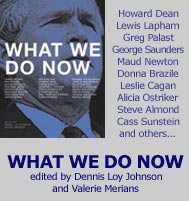
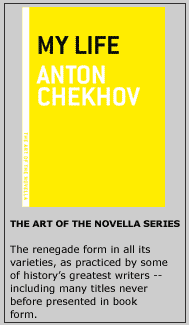
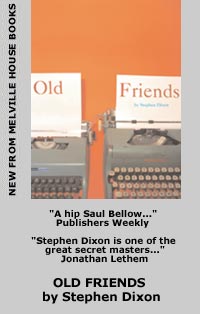
RECENTLY
UNDER–APPRECIATED
From Ig Publishing . . .
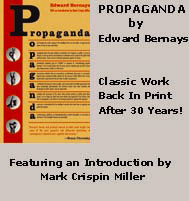

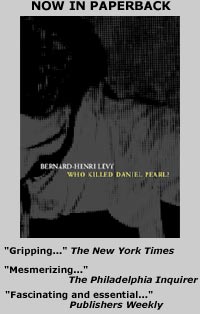
The International Bestseller
WHO KILLED DANIEL PEARL?
by Bernard–Henri Lévy
WHALE SIGHTINGS
"Crank Call"
by Thomas J. Hubschman
(from Me Three)
"Brain Spiders"
by MISSY WILKINSON
(from Prose aX)
This week's poetry:
"Not Pee Wee"
by NICK THRAN
(from Grain)
"Airport"
by ELIZABETH VOLPE
(from Briar Cliff Review)
Special edition:
POEMS FOR THE TIME
First posted in October, 2001, Alicia Ostriker's anthology of poetry that she turned to after the 9/11 attacks — including the work of Stephen Dunn, C.P. Cavafy, Marianne Moore, and others — is far and away the most popular link ever posted on MobyLives. Find out why.

Links